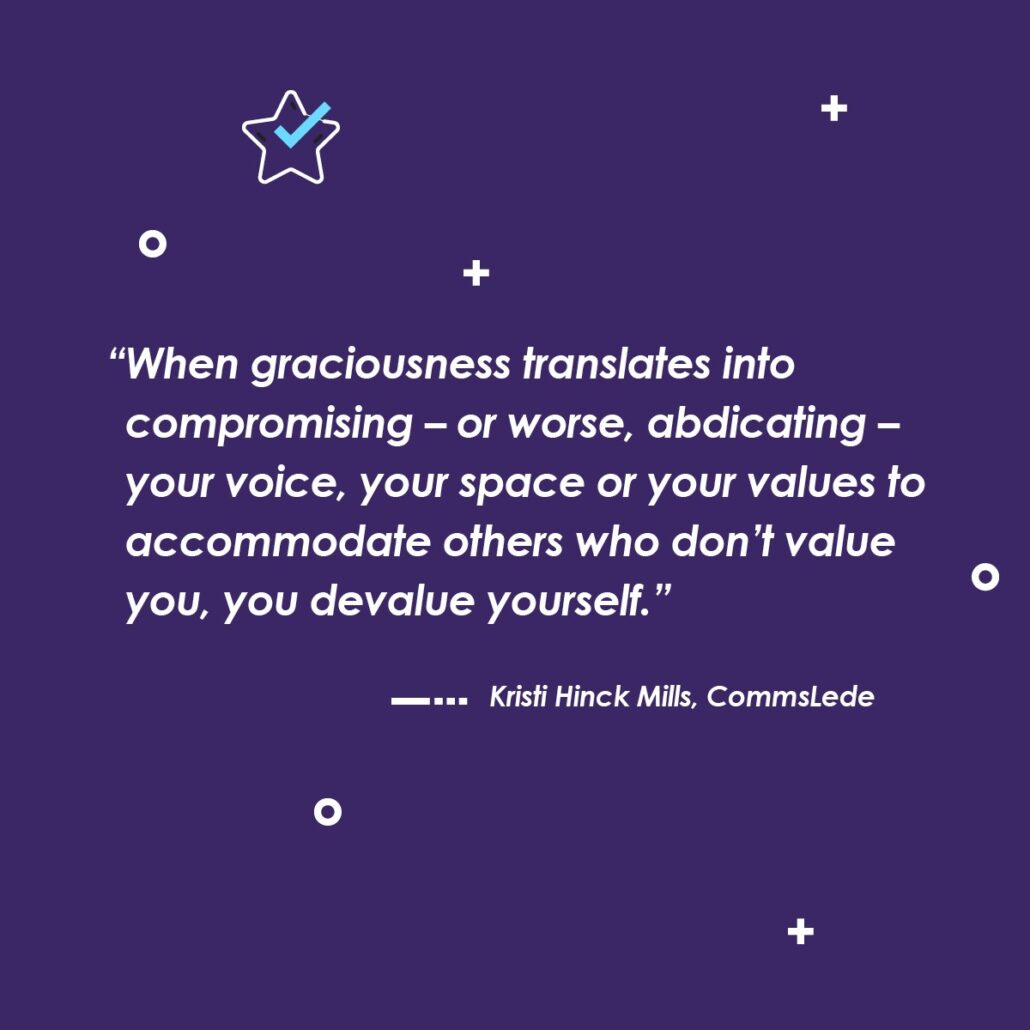
I was born into a gracious family. My mom always let people cut in line ahead of us if they had fewer items to purchase, even if our cart was half unloaded. My grandmother always tipped twenty percent, even if service was poor. My sister would still graciously volunteer to switch airplane seats at the last minute, even if she paid for a window seat and early boarding months ago. We almost always checked our bags when requested, even when the guy ahead of us held tight to his three carry-ons. Beyond being rule followers, we considered ourselves good citizens.
I’m not sure when, but eventually, I learned this behavior isn’t always necessarily “good citizenship,” and here’s why: It’s also critically important for good citizens to hold our space in the world.
When graciousness translates into compromising – or worse, abdicating – your voice, your space, or your values to accommodate others who don’t value you, you ultimately devalue yourself. Giving up your space can also impact people’s trust or confidence in you and erode their faith in your leadership.
What Giving Up Space Looks Like
I recently coached a small business owner who is financially well-off, and simply works “for the joy of working.” She said she sometimes waives payment for clients, since “she doesn’t really need the money,” and “loves what she does.”
While I deeply appreciate her ethos, and I, myself, have waived payments for my service, I gently observed to her, “You give up your space so easily. Why is that?”
We discussed her good fortune and personal values, and she realized that while she was blessed with a comfortable financial situation, when she waived her fees, she also subtly suggested to people around her (and herself) that her time, effort, and commitment had no value.
Giving Up Space in the Corporate World Can Look Very Different
- It can look like overextending yourself by participating in every sub-committee, taskforce or ERG for “exposure” purposes.
- It can look like managers who overcommit their teams to unreasonable timelines or outcomes to meet a leader’s demand, despite the team impact.
- It can look like a person passively waiting to be recognized versus actively self-promoting themselves and their work.
In corporate cultures, this this behavior is often praised as “collaborative support” or “teamwork.” Companies love a hero. But it can also look like relinquishing your space and your agency.
But What About Being a Good Citizen?
There’s a fine line between being a good citizen and giving up space. Giving up subway seats to elderly travelers or pitching in on a project if you have extra bandwidth is good citizenship and teamwork. It’s also a good practice to go above and beyond to support a client or business partner if you have the expertise to share.
But these days, I’ve also learned to recognize bad behavior, and I also hold my space. I set reasonable deadlines. I manage expectations upfront. I give my team air cover and advanced notice, so they can better schedule and do their best work. I know my value, and charge a fair and competitive price for the work I deliver. I always strive to exceed client expectations, and am keenly aware of devaluing phrases such as, “Can you just…” or “It’s really very easy…” or “It’s only adding…” when a request requires significant effort or a project scope substantially creeps.
My clients know I will always have their backs. They know I’ll go above and beyond to deliver an outstanding product. But they also know and respect the value I bring to the table and the time I need to deliver great work.
Why Holding Your Space is Important
Whether it’s setting firm boundaries or learning to speak up when something feels “off,” holding our space is important. It directly impacts us, our teams, our partners, our leaders, and our organizations.
Our teams learn they can trust us and can learn by our modeling. Our leaders learn how to get the best work from us, and what reasonable timelines look like. Our organizations learn the impact of well-being and trust on retention. Most importantly, we learn our value, and can show up as the confident pros we are to deliver work we stand by.
What Does Your Space Look Like?
When clients ask me about “holding space,” I encourage them to think on these questions:
- How do you define your value?
- What boundaries are important to you?
- Have you ever felt devalued, and what were those experiences or scenarios? Are there ways you can prevent them in the future?
- What actions can you take to define and hold your space today?
- What additional space, tools or resources do you need to show up confidently?
Knowing your space and standing confidently in it is one step in being both a good leader, and a good corporate citizen.
With more than two decades of communications experience spanning agencies, Fortune-100 organizations, non-profits and academia, Kristi Hinck Mills brings her passion for employee communications to CommsLede Consulting, where she delivers strategic solutions and executive coaching for her clients. Visit the CommsLede blog for more tips.



